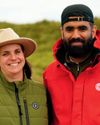
Question: I have often wondered how populations with diets highly restricted by geography and climate manage to get all the essential nutrients they need. For example, how do the indigenous peoples of the Arctic Circle stay healthy on a diet of dried cod and seal? Are they below par healthwise, or have their systems become accustomed to this diet after generations?
Answer: Humans inhabit some of the harshest environments on Earth, successfully sustaining their communities everywhere, from arid deserts and hypoxic high altitudes to the extreme cold of the Arctic Circle. How do they do it? It’s an intriguing story of genetic adaptation and making the most of all available food resources.
A range of communities live within the Arctic Circle, which includes parts of Alaska, Canada, Russia and Greenland. The Inuit, indigenous people who have long lived in northern Canada, parts of Greenland and Alaska, are renowned for their predominantly animal-based diet. But don’t let those meaty headlines fool you. They eat more than just meat and animal fat.
Traditionally living as hunter-gatherers, the Inuit of the Canadian Arctic get most of their dietary energy (75%) from animal fat. Their animal-rich diet includes marine and terrestrial mammals (such as seals and caribou/ reindeer), wild birds and fish, which means they are eating a lot of heart-healthy omega-3 polyunsaturated fatty acids. They eat their meat and fish raw, cooked or fermented, which alters the availability of essential nutrients.
この記事は New Zealand Listener の February 25-March 3 2023 版に掲載されています。
7 日間の Magzter GOLD 無料トライアルを開始して、何千もの厳選されたプレミアム ストーリー、9,000 以上の雑誌や新聞にアクセスしてください。
すでに購読者です ? サインイン
この記事は New Zealand Listener の February 25-March 3 2023 版に掲載されています。
7 日間の Magzter GOLD 無料トライアルを開始して、何千もの厳選されたプレミアム ストーリー、9,000 以上の雑誌や新聞にアクセスしてください。
すでに購読者です? サインイン

A hint of mermaids
Erin Palmisano's latest novel once again has food and romance at the heart of its well-plotted story.

Execution over innovation
Big and bold ideas are fine, but being the best beats being first.

Something's wrong with all of them
Engaging dissection of the 20th-century novel likely to send the reader in search for the book under discussion.

Cell warfare
A NZ trial using immunotherapy to beat a form of blood cancer is expanding after promising results – and it's hoped the 'gold standard' treatment will soon be widely available.

The virus that stole all the smells
In this edited extract from The Forgotten Sense, Jonas Olofsson traces the rise in anosmia as a result of Covid-19 infections.

When caring is ‘woke'
Some years ago, I sat in a small plane circling over Punta del Este in Uruguay. There was a delay and we sat in tense silence until we began our descent. Outside the tiny airport, a taxi ferried us past private Lear jets; these had been the cause of the hold-up. The driver pointed to two planes side by side. \"This one is a Trump plane.\"

Getting along swimmingly
The presenters of Endangered Species Aotearoa spend a fair bit of time on and in the water in the second season.

That clingy feeling
Our pets display the same types of attachment behaviours as we do, or so it seems.

The famous furred
A peaceful little spot in LA is the final resting place for the pets of some of Hollywood's biggest names.

Gone girl
She wandered in on Thursday morning looking very wan, and climbed into her bed. I sat on the edge and stroked her back.